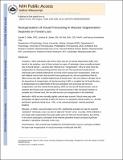Reorganization of Visual Processing in Age-Related Macular Degeneration Depends on Foveal Loss
Author(s)
Dilks, Daniel D.; Julian, Joshua B.; Peli, Eli; Kanwisher, Nancy
DownloadKanwisher_Reorganization of.pdf (242.1Kb)
OPEN_ACCESS_POLICY
Open Access Policy
Creative Commons Attribution-Noncommercial-Share Alike
Terms of use
Metadata
Show full item recordAbstract
Purpose: When individuals with central vision loss due to macular degeneration (MD) view stimuli in the periphery, most of them activate the region of retinotopic cortex normally activated only by foveal stimuli—a process often referred to as reorganization. Why do some show this reorganization of visual processing whereas others do not? We reported previously that six individuals with complete bilateral loss of central vision showed such reorganization, whereas two with bilateral central vision loss but with foveal sparing did not, and we hypothesized that the effect occurs only after complete bilateral loss of foveal vision. Here, we conduct a stronger test of the dependence of reorganization of visual processing in MD on complete loss of foveal function, by bringing back one (called MD6) of the two participants who previously did not show reorganization and who showed foveal sparing. MD6 has now lost all foveal function, and we predicted that if large-scale reorganization of visual processing in MD individuals depends on complete loss of foveal input, then we will now see such reorganization in this individual.
Methods: MD6 and two normally sighted control subjects were scanned. Stimuli were gray-scale photographs of objects presented at either the fovea or a peripheral retinal location (i.e., the MD participant’s preferred retinal locus or the control participants’ matched peripheral location).
Results: In MD6, visual stimulation at the preferred retinal locus significantly activated not only the expected “peripheral” retinotopic cortex but also the deprived “foveal” cortex. Crucially, MD6 exhibited no such large-scale reorganization 5 years earlier when she had some foveal sparing. By contrast, in the control participants, stimulation at the matched peripheral location produced significant activation in peripheral retinotopic cortex only.
Conclusions: We conclude that complete loss of foveal function may be a necessary condition for large-scale reorganization of visual processing in individuals with MD.
Date issued
2014-08Department
Massachusetts Institute of Technology. Department of Brain and Cognitive Sciences; McGovern Institute for Brain Research at MITJournal
Optometry and Vision Science
Publisher
Ovid Technologies (Wolters Kluwer) - Lippincott Williams & Wilkins
Citation
Dilks, Daniel D., Joshua B. Julian, Eli Peli, and Nancy Kanwisher. “Reorganization of Visual Processing in Age-Related Macular Degeneration Depends on Foveal Loss:” Optometry and Vision Science 91, no. 8 (August 2014): e199–206.
Version: Author's final manuscript
ISSN
1040-5488